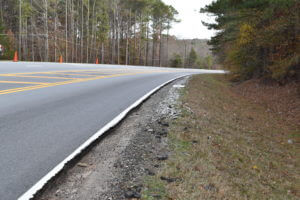The shoulder of a road should generally be even with the pavement.
When the shoulder has an excessive drop-off, it can be dangerous to motorists who accidentally drift onto the shoulder. The technical term for a shoulder drop-off is an “edge of pavement drop-off.”
Highway safety experts consider a drop-off of 5 inches or more to be unsafe. According to the U.S. Department of Transportation Federal Highway Administration, a drop-off of 2 inches or more is considered a potential driving hazard.
If you have been injured or lost a loved one because of a car accident caused by an unsafe or defective road, you have the right to attempt to hold the responsible parties accountable and to pursue full and fair compensation for your loss.
Our personal injury lawyers offer free consultations with no fee or cost unless we win a verdict or settlement in your case.
Contact us online or call (706) 354-4000 today to get started.
If you have catastrophic injuries from a crash or your loved one was killed in a crash because of an edge of pavement drop-off, call us 24/7 and speak to an attorney. If it’s after hours or on a weekend or holiday, hit the prompt to speak to an attorney immediately.
How is Edge of Pavement Marked?
The “edge of pavement” is defined by edge lines that outline and distinguish the main driving surface from the shoulder. These lines enhance road safety by providing clear boundaries: typically, the right edge of the pavement is marked with a solid white line, and the left edge with a solid yellow line.
Unsafe Roads Hazardous to Georgia Drivers
From October 31, 2014, to September 23, 2019, the Georgia Department of Transportation (GDOT) recorded 646 crashes on Georgia roads with “shoulder” as a contributing factor. One of the most dangerous shoulder hazards is an edge of pavement drop-off.
Why Are Edge of Pavement Drop-Offs Dangerous?
Generally accepted national design and engineering standards prohibit a vertical edge of pavement drop-off (also called a shoulder drop-off) larger than two inches.
A shoulder drop-off occurs when there’s a significant change in elevation between the road surface and its adjacent shoulder or between two lanes, surpassing safe limits.
Vertical edge of pavement drop-offs that are larger than two inches pose the risk of tire scrubbing, oversteering, and loss of vehicle control. Scrubbing is when the inside wall of the passenger tire rubs on the edge of the pavement.
Many times, drivers will oversteer to return to the roadway while maintaining their traveling speed. When the tire comes out of the rut and onto the pavement, it regains traction while turned sharply and causes the driver to lose control of the vehicle. This can throw the vehicle into oncoming traffic or off the opposite side of the roadway. The steep edge can also make it difficult for a driver to re-enter the paved travel lane safely.
The result of an unsafe drop-off can have devastating consequences such as a crash with injuries. A crash because of a defective road can sometimes be fatal.
Georgia Roadway Drop-Off Regulations

In hopes of reducing the danger presented by edge of pavement drop-offs, the Federal Highway Administration and Georgia Department of Transportation (GDOT) developed the safety edge, which is a 30–40-degree angle asphalt filet along each side of the roadway.
The safety edge allows cars whose tires have dropped off the road to safely re-enter the roadway. On September 30, 2011, GDOT issued a policy announcement making the Safety Edge the standard construction for the outside edge of all uncurbed pavements, excluding pavement behind guardrails.
While all resurfaced roads should be constructed with a safety edge, unfortunately, that does not always happen. Either through contractor error, GDOT oversight, or negligent maintenance, some Georgia roads still have a dangerous edge of pavement drop-off.
When Can a State Be Held Liable?
GDOT has sovereign immunity because it is a state agency. Sovereign immunity is the legal concept that the state itself cannot be sued without its consent.

The Georgia Constitution of 1983 gives sovereign immunity to all state departments and agencies unless an act passed by the General Assembly permits the agency to be sued by waiving sovereign immunity.
One such waiver is the Georgia Tort Claims Act (GTCA), which does permit victims to file personal injury claims against the state under specific circumstances.
The waiver of immunity in the GTCA is subject to some exclusions, which gives the state immunity from suits regarding road defects when the plan or design of the road is prepared in substantial compliance with generally accepted engineering or design standards.
In addition to design defects, the state can also be held responsible for injuries caused by negligent maintenance of a roadway when the road deteriorates to a point that it is not in compliance with its original design. An example of negligent maintenance is when the shoulder of a road deteriorates to the point it has an edge of pavement drop-off greater than two inches.
The BBGA Difference – Contact an Experienced Attorney

Overcoming sovereign immunity is a tall task that may be impossible if you do not have an experienced attorney to bring a lawsuit against the state.
The Georgia personal injury attorneys at Blasingame, Burch, Garrard & Ashley, P.C. are well versed in what is accepted engineering or design standards for roadways and drop-offs.
If you were injured, or your loved one was killed in a crash because of an unsafe road, we can help you hold the right people responsible.
Our attorneys have a thorough understanding of roadway hazards and can help identify and establish defects during a post-crash investigation. It is important to contact an attorney right away if you have suffered injuries in a crash because of a road defect.
The conditions of the crash site can sometimes quickly change. For instance, the GDOT may repair the drop-off following a crash, heavy traffic may alter the crash site, or heavy rain or other inclement weather may result in a loss of critical evidence.
Contact us today if you or a loved one have been injured because of a roadway defect or unacceptable drop-off.
You can reach us by phone at (706) 354-4000, or you can fill out our contact form to tell us more about your potential case. We offer free consultations and there is no cost unless we recover money for you in your case.
We are available 24/7 for emergency calls. If you have catastrophic injures from a crash caused by a defective road or your loved one was killed, call us at the number above. If it’s after hours, a weekend, or holiday, follow the phone prompts to speak to a live person.

